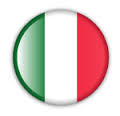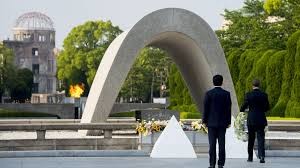 Settantuno anni fa, in una splendida giornata soleggiata, senza nuvole, dal cielo è sceso qualcosa che ha cambiato il mondo: un flash di luce e tantissimo fuoco ha distrutto una città e ha dimostrato che l’umanità aveva i mezzi per autodistruggersi.
Settantuno anni fa, in una splendida giornata soleggiata, senza nuvole, dal cielo è sceso qualcosa che ha cambiato il mondo: un flash di luce e tantissimo fuoco ha distrutto una città e ha dimostrato che l’umanità aveva i mezzi per autodistruggersi.
Perché veniamo qui in questo luogo, a Hiroshima?
Veniamo qui per toccare con mano quanto una terribile forza ha toccato questo territorio. Veniamo qui per pregare per i morti, più centinaia di migliaia di giapponesi sono morti, anche coreani e americani: le loro anime ci parlano, ci chiedono di andare avanti e di ricordarci chi siamo e chi potremmo diventare. Non è il fatto che la guerra ha proprio definito Hiroshima, ma ci dicono che i conflitti violenti sono apparsi all’uomo per la prima volta. Abbiamo capito che non dobbiamo usare mezzi di guerra per atti bruttissimi, dobbiamo ricordarci la storia della civiltà che è fatta di tantissime cicatrici e queste cicatrici sono atto di nazionalismi, di imperi che sono caduti. Tantissime sono le persone segregate e poi liberate, tante sono le cose che ci accadranno in futuro.
Tante sono le persone dimenticate nei tempi. La guerra mondiale, che ha raggiunto il suo picco peggiore proprio qui, ci dimostra quanto siano forti le nazioni. Le città hanno creato tanti pensatori di giustizia e verità e ora il mondo è sempre basato e guidato da idee di conquiste, di lotta, amplificate purtroppo anche da tantissime altre nuove forze. Nei prossimi anni magari circa 60 milioni di persone moriranno: uomini, donne, bambini, senza alcuna differenza tra di noi, verranno uccisi, ci saranno bombe, verranno imprigionati, moriranno di sete, di fame.
Ci sono tantissimi segnali in tutto il mondo che ci dicono che questo accadrà. Sappiamo anche che purtroppo c’è tanta depravazione anche fra tutte le persone. In questo luogo, guardando negli occhi della storia, guardando tutto questo ci ricorda tutte le contraddizioni che ci distinguono e ci danno forza per capire quello che accaduto e quello che accadrà di noi e soprattutto il nostro volere.
Quanto spesso magari l’innovazione ci porta a fare questo, quanto facilmente possiamo giustificare la violenza in nome di qualcos’altro. Ogni grande religione dà grandissime promesse, ma nessuna ci ha dato la possibilità di uccidere. Le nazioni che si sono unite nei tempi hanno sempre prodotto qualcosa di positivo e tentato di rendere più umani quanti hanno fatto ciò che non era positivo. La scienza ci indica di andare avanti, scoprire qualcosa di nuovo, però la scienza ci ha anche permesso di creare macchine di distruzione. Hiroshima ci insegna questa verità: il progresso tecnologico non è equivalente al progresso meramente tecnologico. La rivoluzione scientifica richiede una rivoluzione ancor più importante, ecco perché veniamo qui.
Siamo qui nel bel mezzo di questa città e ci forziamo a immaginare il momento in cui questa bomba è caduta: cosa hanno provato i bambini? Ascoltiamo un urlo silente, ricordiamo tutti gli innocenti che sono stati uccisi in quella guerra, quelle accadute prima e soprattutto le guerre che verranno. Le tante parole non potrebbero dar voce a quello che è accaduto, ma dobbiamo pensare a cosa dobbiamo fare per evitare di soffrire ancora. Un giorno queste forze, queste voci ci aiuteranno e tante saranno le persone che non saranno più con noi, ma il 6 Agosto 1945 non è mai abbastanza.
Quel ricordo ci permette di andare avanti e immaginare quello che accadrà, ci permette di cambiare. E proprio sulla base di quella giornata abbiamo fatto scelte che ci hanno dato speranza: Stati Uniti e Giappone hanno chiesto non semplicemente di unirsi e hanno formato un’alleanza, le nazioni dell’Europa hanno cercato di coprire ciò che è accaduto durante le guerre e procedere verso una nuova era, una comunità internazionale ha istituzioni per evitare le guerre e soprattutto le armi nucleari.
Ora ogni atto di violenza, di terrore, di crudeltà fra le nazioni ci dimostra che il nostro lavoro non è ancora stato fatto. Magari non saremo in grado di eliminare le capacità sulle armi nucleari, tra le nazioni che hanno ancora grandi armamenti nucleari dobbiamo avere il coraggio di scappare da questa bruttissima logica. Magari in una vita non riusciremo a raggiungere questo obiettivo. Possiamo fare il possibile per distruggere questi armamenti o bloccare l’acquisto da parte di fanatici, ma questo non sarà mai abbastanza. In tutto il mondo i fucili più forti danno risultati negativi.
Dobbiamo cambiare il nostro modo di pensare, usare la diplomazia e bloccare i conflitti. La nostra indipendenza è basata sulla cooperazione pacifica e non sulla violenza. Prima di tutto dobbiamo rimarginare i nostri legami fra di noi come membri di una razza umana. Ecco perché le nostre specie sono uniche: possiamo imparare, possiamo scegliere, possiamo raccontare ai nostri figli una storia diversa, che descrive un’umanità comune che fa meno guerre e ha meno crudeltà. Le storie di queste nazioni sono iniziate purtroppo con tante guerre, tutti gli uomini però sono creati uguali e hanno tutti diritti inalienabili: la libertà e la ricerca della felicità. Non è mai stato semplice realizzare che questi diritti fossero fondamentali, ma basandoci sempre su questo aspetto dobbiamo continuare a portare avanti questi ideali che vanno ben al di là dei continenti e delle nazioni: il valore di dare fiducia e importanza a ogni vita.
La nozione radicale e necessaria è che siamo un’unica sola famiglia: quella è la storia che dobbiamo raccontare. Ecco perché siamo qui ad Hiroshima. Quindi dovremo pensare alle persone che amiamo, il primo sorriso dei nostri figli la mattina, la carezza che si può fare a un famigliare a colazione, l’abbraccio di un amico o di un famigliare: dobbiamo pensare a questi aspetti e quei momenti preziosi li dobbiamo portare anche qui. Le persone che sono morte sono proprio come noi.
Le persone semplici comprendono quello che sto dicendo. Nessuno vuole guerre, vorrebbero che tutti i progressi della scienza potessero essere concentrati su altre cose. Le scelte fatte dai leader riflettono questa semplice saggezza e il lavoro di Hiroshima potrebbe concludersi proprio qui. Il mondo è stato cambiato per sempre proprio qui, ma oggi i bambini di questa città dovranno e potranno affrontare la propria giornata in pace, sono protetti e proprio questa protezione dev’essere estesa a ogni bambino. È un futuro che possiamo scegliere, dove Hiroshima e Nagasaki sono conosciute come l’inizio di un nostro risveglio morale.
(*) discorso del Presidente degli Stati Uniti del 27 maggio 2016
![]() The following is the full text of Obama’s speech:
The following is the full text of Obama’s speech:
* * *
Seventy-one years ago, on a bright, cloudless morning, death fell from the sky and the world was changed. A flash of light and a wall of fire destroyed a city and demonstrated that mankind possessed the means to destroy itself.
Why do we come to this place, to Hiroshima? We come to ponder a terrible force unleashed in a not so distant past. We come to mourn the dead, including over 100,000 in Japanese men, women and children; thousands of Koreans; a dozen Americans held prisoner. Their souls speak to us. They ask us to look inward, to take stock of who we are and what we might become.
It is not the fact of war that sets Hiroshima apart. Artifacts tell us that violent conflict appeared with the very first man. Our early ancestors, having learned to make blades from flint and spears from wood, used these tools not just for hunting, but against their own kind. On every continent, the history of civilization is filled with war, whether driven by scarcity of grain or hunger for gold; compelled by nationalist fervor or religious zeal. Empires have risen and fallen. Peoples have been subjugated and liberated. And at each juncture, innocents have suffered, a countless toll, their names forgotten by time.
The World War that reached its brutal end in Hiroshima and Nagasaki was fought among the wealthiest and most powerful of nations. Their civilizations had given the world great cities and magnificent art. Their thinkers had advanced ideas of justice and harmony and truth. And yet, the war grew out of the same base instinct for domination or conquest that had caused conflicts among the simplest tribes; an old pattern amplified by new capabilities and without new constraints. In the span of a few years, some 60 million people would die–men, women, children no different than us, shot, beaten, marched, bombed, jailed, starved, gassed to death.
There are many sites around the world that chronicle this war–memorials that tell stories of courage and heroism; graves and empty camps that echo of unspeakable depravity. Yet in the image of a mushroom cloud that rose into these skies, we are most starkly reminded of humanity’s core contradiction; how the very spark that marks us as a species–our thoughts, our imagination, our language, our tool-making, our ability to set ourselves apart from nature and bend it to our will–those very things also give us the capacity for unmatched destruction.
How often does material advancement or social innovation blind us to this truth. How easily we learn to justify violence in the name of some higher cause. Every great religion promises a pathway to love and peace and righteousness, and yet no religion has been spared from believers who have claimed their faith as a license to kill. Nations arise, telling a story that binds people together in sacrifice and cooperation, allowing for remarkable feats, but those same stories have so often been used to oppress and dehumanize those who are different.
Science allows us to communicate across the seas and fly above the clouds; to cure disease and understand the cosmos. But those same discoveries can be turned into ever-more efficient killing machines.
The wars of the modern age teach this truth. Hiroshima teaches this truth. Technological progress without an equivalent progress in human institutions can doom us. The scientific revolution that led to the splitting of an atom requires a moral revolution, as well.
That is why we come to this place. We stand here, in the middle of this city, and force ourselves to imagine the moment the bomb fell. We force ourselves to feel the dread of children confused by what they see. We listen to a silent cry. We remember all the innocents killed across the arc of that terrible war, and the wars that came before, and the wars that would follow.
Mere words cannot give voice to such suffering, but we have a shared responsibility to look directly into the eye of history and ask what we must do differently to curb such suffering again. Someday the voices of the hibakusha will no longer be with us to bear witness. But the memory of the morning of August 6th, 1945 must never fade. That memory allows us to fight complacency. It fuels our moral imagination. It allows us to change.
And since that fateful day, we have made choices that give us hope. The United States and Japan forged not only an alliance, but a friendship that has won far more for our people than we could ever claim through war. The nations of Europe built a Union that replaced battlefields with bonds of commerce and democracy. Oppressed peoples and nations won liberation. An international community established institutions and treaties that worked to avoid war and aspire to restrict and roll back, and ultimately eliminate the existence of nuclear weapons.
Still, every act of aggression between nations; every act of terror and corruption and cruelty and oppression that we see around the world shows our work is never done. We may not be able to eliminate man’s capacity to do evil, so nations-and the alliances that we’ve formed-must possess the means to defend ourselves. But among those nations like my own that hold nuclear stockpiles, we must have the courage to escape the logic of fear, and pursue a world without them.
We may not realize this goal in my lifetime. But persistent effort can roll back the possibility of catastrophe. We can chart a course that leads to the destruction of these stockpiles. We can stop the spread to new nations, and secure deadly materials from fanatics.
And yet that is not enough. For we see around the world today how even the crudest rifles and barrel bombs can serve up violence on a terrible scale. We must change our mindset about war itself-to prevent conflict through diplomacy, and strive to end conflicts after they’ve begun; to see our growing interdependence as a cause for peaceful cooperation and not violent competition; to define our nations not by our capacity to destroy, but by what we build.
And perhaps above all, we must reimagine our connection to one another as members of one human race. For this, too, is what makes our species unique. We’re not bound by genetic code to repeat the mistakes of the past. We can learn. We can choose. We can tell our children a different story-one that describes a common humanity; one that makes war less likely and cruelty less easily accepted.
We see these stories in the hibakusha-the woman who forgave a pilot who flew the plane that dropped the atomic bomb, because she recognized that what she really hated was war itself; the man who sought out families of Americans killed here, because he believed their loss was equal to his own.
My own nation’s story began with simple words: All men are created equal, and endowed by our Creator with certain unalienable rights, including life, liberty and the pursuit of happiness. Realizing that ideal has never been easy, even within our own borders, even among our own citizens.
But staying true to that story is worth the effort. It is an ideal to be strived for; an ideal that extends across continents, and across oceans. The irreducible worth of every person, the insistence that every life is precious; the radical and necessary notion that we are part of a single human family-that is the story that we all must tell.
That is why we come to Hiroshima. So that we might think of people we love–the first smile from our children in the morning; the gentle touch from a spouse over the kitchen table; the comforting embrace of a parent-we can think of those things and know that those same precious moments took place here seventy-one years ago. Those who died-they are like us. Ordinary people understand this, I think. They do not want more war. They would rather that the wonders of science be focused on improving life, and not eliminating it.
When the choices made by nations, when the choices made by leaders reflect this simple wisdom, then the lesson of Hiroshima is done.
The world was forever changed here. But today, the children of this city will go through their day in peace. What a precious thing that is. It is worth protecting, and then extending to every child. That is the future we can choose-a future in which Hiroshima and Nagasaki are known not as the dawn of atomic warfare, but as the start of our own moral awakening.



